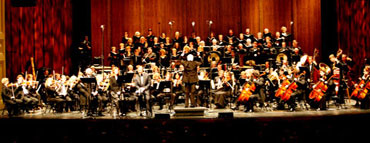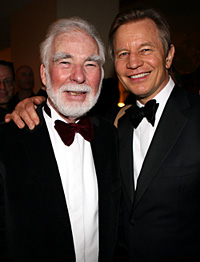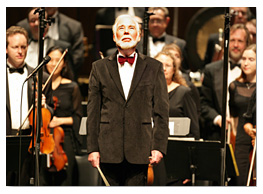

  |
|
|
||||||||||||||||||||||
|
FMS FEATURE... May 22, 2006 Hollywood Symphony Orchestra Debuts at Royce Hall John Scott leads first-rate orchestra in eclectic film music program by Jon Burlingame  Photo courtesy Bill Dow Composer John Scott, artistic director of the newly formed ensemble, conducted the two-and-a-half-hour program before an enthusiastic crowd of 800. The unquestioned high point was Scott's newly arranged 43-minute concert work (for orchestra, choir and narrators) based on his 1972 score for Antony and Cleopatra, Charlton Heston's film based on the Shakespeare play.  Scott with York Heston's wife Lydia and son Fraser, who worked on the film, were on hand for this premiere performance. Scott chose a striking piece with which to begin the concert: "The Dome" from Jerry Goldsmith's score for Logan's Run (1976), which Scott reorchestrated from Goldsmith's original sketches. Scott also created new arrangements for three of the four themes in a segment he called "Landmark Scores": Elmer Bernstein's Sweet Smell of Success (1957), Alex North's A Streetcar Named Desire (1951) and Henry Mancini's television theme Peter Gunn (1958), all of which featured jazz elements that clearly appealed to Scott as a former jazz flutist in British studio orchestras. His arrangements shifted the balance toward the kind of jazz-classical fusion that may have been unsettling to purists expecting the original, post-bop sounds of Bernstein and Mancini, especially, but they offered a fresh look at each theme. Scott's remarks were especially interesting when he talked about Mancini and playing on the original scores of Charade, Two for the Road and Arabesque, all of which were recorded in London. He dedicated Sweet Smell of Success to Hilary Mackendrick (widow of the film's director Alexander Mackendrick), who as vice president of the Hollywood Symphony Orchestra Society has been a prime moving force in launching the nonprofit enterprise. Erich Wolfgang Korngold's theme for Kings Row (1942), fourth of the "Landmark Scores," was the familiar concert version. And, as a fun treat to conclude the first act, Scott offered an entirely fresh take on Victor Young's Around the World in 80 Days (1956). Essentially a fantasia on the Oscar-winning classic theme, it was (according to the program notes) "conceived as a mini-concerto for orchestra in which the theme is thrown about between the various musicians, who are all tested in their various skills." Scott chose to perform two works by "classical" composers. The first, Gustav Mahler's romantic Adagietto from Symphony No. 5, was featured in the score for Luchino Visconti's 1969 classic Death in Venice. The second, excerpts from Ralph Vaughan Williams' Sinfonia Antartica, was a more obvious choice, as the composer based it on his score for the 1948 British film Scott of the Antarctic. The latter featured soprano Renee Burkett. In introducing the piece, Scott pointed out that, while wordless soprano and choir have become virtual cliches in modern film scores, they were quite unusual in that era. The orchestra performed just six minutes; still more would have been welcome. Scott fans were also treated to eight minutes of his grand score for Greystoke: The Legend of Tarzan, Lord of the Apes (1984), perhaps his best-known American film, with its alternately savage and stately music for the Edgar Rice Burroughs jungle adventure.  Final Bow Photo courtesy Bill Dow John Williams' new five-minute orchestral arrangement of "Sayuri's Theme" from last year's Oscar-nominated Memoirs of a Geisha score received its world premiere at the concert, with a fine solo turn by flutist Bob Shulgold. Scott revealed future plans for a concert arrangement of Alex North's score for the John Ford classic Cheyenne Autumn at an upcoming HSO concert. ©2006 Jon Burlingame |
Search
Past Features
|